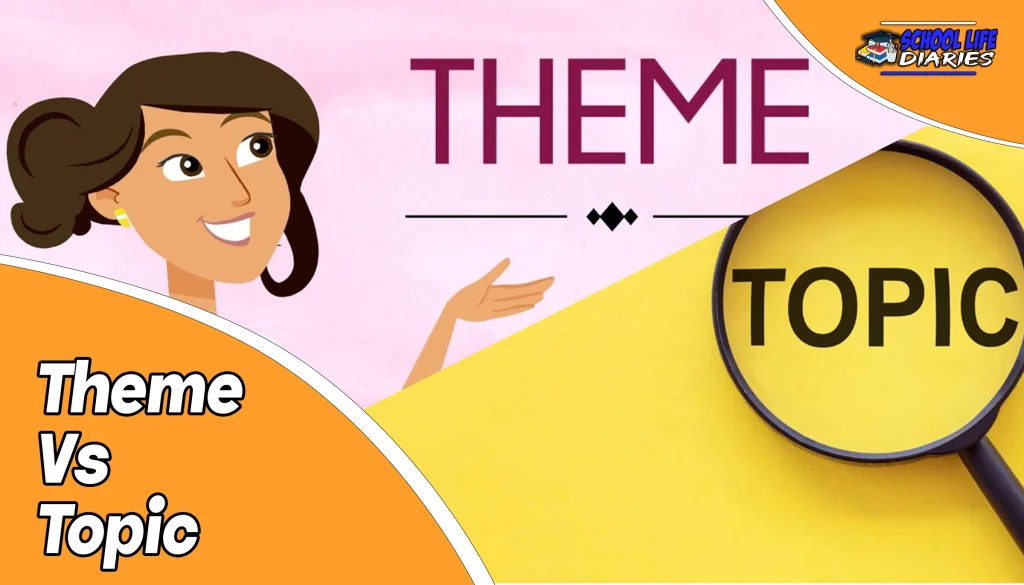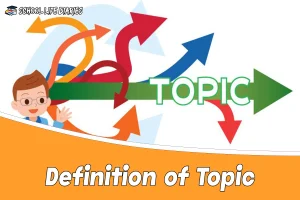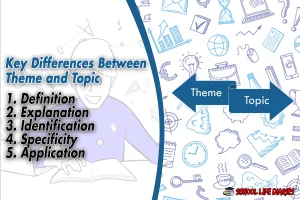When it comes to writing, understanding how to differentiate between a theme and a topic can be incredibly helpful in achieving success as an essay writer. Themes and topics both hold important places in writing and have different properties that provide added depth, clarity, and context for readers.
In this blog post, we’ll explore the differences between themes and topics by looking at examples from literature, media, history, and even your own writing. We’ll also discuss why each plays such an essential role when constructing thoughtful pieces of written work. So if you’re ready to improve your writing skills through better comprehension of these useful literary tools.
Comparison Chart
| BASIS FOR COMPARISON | THEME | TOPIC |
|---|
Meaning | The theme is an overarching idea or concept that is conveyed in a piece of writing. | The topic is the main idea or subject of a piece of writing. |
| Scope | General | Specific |
| Nature | Universal | Unique |
| How it’s expressed | clearly stated | implied |
Explanation | Theme explains why that particular piece of writing was written. | The topic explains what that writing is about. |
Definition of Topic
A topic is the main subject or idea that a piece of writing focuses on. It can be an issue, concept, principle, or question that the writer explores and discusses in depth through their writing. A topic also serves as a way to organize ideas so that readers can easily understand them. It acts as a lens to direct the reader’s attention, allowing them to more easily draw connections between ideas and comprehend what is being discussed.
It helps writers ensure that their paper stays on track, so they don’t get lost in a scattered train of thought. An effective topic can be used to make readers become emotionally invested in the material by sparking their interest or inspiring them to think more deeply. As such, it is a crucial component in producing an engaging and effective essay/piece of writing.
It can also be used to draw readers in by creating a provocative discussion that encourages debate and further exploration. A topic serves as the foundation for any piece of writing. It provides structure and direction and shapes the way readers interact with the text. By using a strong and compelling topic, writers can more effectively communicate their ideas in a clear and concise manner.
Examples of Topic In Literature
The best way to understand this is to look at a few examples in literature.
– The Impact of Gym Ownership on Physical and Mental Health
– Exploring the Business Model of Successful Gym Owners
– Examining the Financial Benefits of Owning a Gym
– How to Create an Effective Marketing Strategy for Your Gym
– Analyzing the Benefits of Offering Specialized Classes
– Understanding the Role of Technology in Fitness Centers
– Developing Sustainable Practices to Enhance Member Engagement
– Implementing Strategies to Increase Gym Visits and Retention
– Creating an Environment That Encourages Healthy Habits and Wellness
Definition of Theme
The theme of a story is the central idea or message that the author seeks to convey to its readers. It is the underlying meaning that gives a narrative its significance and purpose, as well as its moral value. It is expressed through characters, symbols, images, and settings in a given work of literature. A story’s theme can range from simple to complex. It can focus on a single issue, or it can be an exploration of multiple themes.
In some cases, the theme may remain subtle and implied; in others, it is clearly stated and unambiguous. Themes are also closely linked to symbols and motifs in literature, which help to convey the ideas behind a story. The theme of a story is the takeaway lesson or the moral that the author hopes readers take away from the piece. Through its themes, literature can help us to explore and understand our own lives and experiences more fully.
It can also provide insight into different cultures and ways of thinking. By paying attention to themes in literature, we can gain a greater understanding of the human condition. Through stories, authors can communicate valuable lessons, question our beliefs and assumptions about life, and push us to think more deeply about who we are and how we live.
How Is Theme Expressed?
Theme is often expressed in literature through the words, actions, and thoughts of characters. The characters’ reactions to their experiences and situations can provide clues about the main idea or message that the author wishes to convey. For example, a character who is brave and displays courage in the face of adversity may be demonstrating bravery as a theme in the story.
Similarly, characters who experience redemption or regret can speak to the theme of forgiveness and atonement. By delving into the characters’ choices and actions, readers can uncover the main message that an author is trying to convey in their work. It’s important to note that authors do not always explicitly spell out the theme of a work.
Instead, the theme is often implied in the narrative and readers must make inferences about it by closely examining the characters’ words and behaviors. Theme can be expressed through objects such as symbols or colors which appear frequently throughout a work of literature. For example, a yellow dress may represent hope or innocence depending on how it is used in the text.
Examples of Theme In Literature
The best way to understand this is to look at a few examples in literature.
– The Power of Love in Romeo and Juliet
– The Triumph of Good over Evil in Lord of the Rings
– Betrayal and its Consequences in Othello
– Honesty as a Virtue in To Kill a Mockingbird
– Overcoming Adversity with Hard Work in Great Expectations
– Defying Oppression with Bravery in The Hunger Games
Using Theme and Topic In Your Writing
– How to Incorporate Theme and Topic into an Essay
– An Analysis of Different Themes in Literature
– Using Symbolism to Enhance You’re Writing Through the Use of Theme and Topic
– Understanding the Role of Color in Literary Works: A Look at Topic and Theme
– How to Incorporate Voice into Your Writing Through Theme and Topic
– Analyzing Character Development in Relation to Theme and Topic
– Exploring Different Types of Narrative Structures Based on Theme and Topic
– Strategies for Incorporating Genre into an Essay or Piece of Fiction: An Exploration of Theme and Topic
Key Differences Between Theme and Topic
Here are some key differences between theme and topic:
1. Definition:
Theme is the general underlying message or idea that an author is trying to convey, while topic refers to the subject matter being discussed.
2. Explanation:
The topic describes what is being talked about, while the theme explains why it matters and what deeper meaning there might be in the content.
3. Identification:
The theme helps us identify the overall message of a work, while the topic can be used to identify the specific elements of that work.
4. Specificity:
The topic is more specific than the theme and provides us with more detailed information about what we are discussing. The theme, on the other hand, is more general and helps us understand the broader implications of something.
5. Application:
The topic is the basis of our writing, while the theme helps us apply that knowledge to a larger context or audience.
Related Article: What Is Edgenuity Cumulative Exam? Comprehensive Vs Cumulative Exams
Are The Theme and Topic The Same?
No, the theme and topic are not the same. The theme is the overall idea behind the blog post, while the topic is more specific and focuses on a particular aspect of that broader idea. For example, if your theme is “gym owners,” then topics could include “what you need to know before buying a gym” or “how to increase member retention.”
So while the theme is the overarching idea, topics are more specific and narrow down the content to create a focused conversation. In order to write effective blog posts, it’s important to choose an engaging topic that ties in with your chosen theme. This helps draw readers in and keeps them interested enough to finish reading the post.
Once you have selected a topic, you can begin to brainstorm ideas and create an outline of what the post will cover. Make sure your content is helpful and relevant by including facts, statistics, and other information that would be useful to readers.
Conclusion: Theme Vs Topic
Understanding the difference between theme and topic is essential for effective communication and clear writing. While both terms are related to the main idea of a piece of writing, they serve different functions. Topics are the specific subject matter, while themes are the underlying message or meaning that the writer wants to convey.
It is important to choose a clear and specific topic to give your writing direction, but it is equally important to develop a coherent and meaningful theme to engage your audience and convey your message effectively. By mastering the distinction between theme and topic, you can improve your writing and better connect with your readers.







